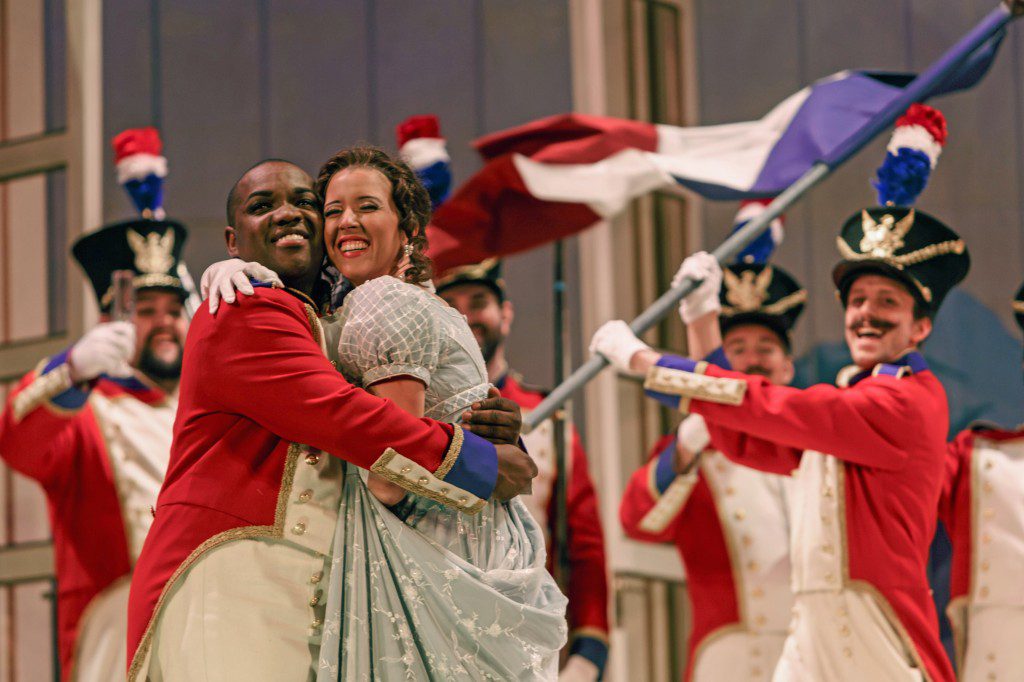Ex-Dancer Directs Donizetti at WNO
By • October 26, 2016 0 1024

Operas, like other performing arts occasions, are full of firsts: first time, first role, first time here, first starring role — not to mention the first note of the night.
The opening night of Washington National Opera’s production of Gaetano Donizetti’s exuberant opera comique “The Daughter of the Regiment” will feature Supreme Court Justice Ruth Bader Ginsberg, a noted opera buff (along with the late Justice Antonin Scalia), who has appeared onstage in cameo roles at WNO before. But this time, for one night only, she will be making her debut in a speaking role as the Duchess of Krakenthorp.
This will no doubt add a frisson to the life of Robert Longbottom, the noted choreographer and director, who is experiencing a first of his own. Longbottom is known for his work as a director of chance-taking, eclectic, original plays and musicals, including the well-received “Mister Roberts” at the Kennedy Center in 2005, as well as the original Broadway production of “Side Show” and revivals of “Bye Bye Birdie” on Broadway and “Carnival” at the Kennedy Center. But he is directing an opera for the first time.
“I know,” he said in a telephone interview, “it’s an amazing experience, but it’s also something I’ve always wanted to do. You could say it’s all theater, and that would be only partly true. With opera, it’s always the music. The music, it’s the centerpiece of everything. And the whole process is very different, too. It’s not like putting a musical together, trying out new concepts, or that kind of thing.
“For a Broadway director, it’s completely different. It would be like starting rehearsals for a Broadway show where everyone already knows all the lines, everything is complete. In many ways, it’s all set. The music won’t change, the songs, the words, the lyrics won’t change. It’s a truly professional environment and your job is to make sure everything comes together.
“Still, ‘The Daughter of the Regiment’ is a little different,” he said. “It has this very intricate plot about a young girl who’s been raised by a regiment of soldiers, and she’s young, at an age where romance is in the air, it’s an awkward time. It has comedy, slapstick, a comic, non-singing part [the Duchess]. The girl, Marie, is a part of the regiment, that’s her family. She has no experience of a mother, and then she meets a handsome young man named Tonio and it turns out that she has indeed a family. And there’s an aunt, issues of class, war — it’s the Napoleonic Wars — and the girl has to learn how to be a woman, and what that means, and what her destiny and her place is. She has 27 fathers and no mother. She has to learn how to be a real woman. It’s got a little ‘Pygmalion’ aspect to it.
“And, yes, it’s very much a kind of romantic comedy. It’s light, full of high energy and all that remarkable music and those difficult arias. So, yes, it comes very close to the territory of operettas. There’s a lot of spoken dialogue — in French — more than the norm in most operas. But, you know, it also touches on gender issues, how to be who you are. It’s romantic and funny, but it has compelling characters, too.
“I’ve seen productions of this,” he said, “and it’s been set sometimes in World War II or World War I, but I think this is a perfect setting for this particular opera. It’s the 19th century, it’s Napoleon and it’s also a very operatic time, and a time, a century, that’s something of a golden age for opera, and for Donizetti, too.”
Donizetti isn’t always associated with comedy — think of the almost stern and intricate historic mechanics of “Anna Bolena” and “Lucrezia Borgia” and the dark histrionics of “Lucia di Lammermoor.”
Longbottom — who began his theatrical life as a dancer, including a stint in “A Chorus Line” — seems most proud of “Side Show,” a musical about carnival life and the lives of co-joined sisters. “It took some convincing in terms of an idea for a show, but in its incarnations it did well with the critics, audiences loved it. But somehow it never quite carved out a huge presence. Sometimes it’s about timing.” “Carnival” was another ground-up show he directed, a bittersweet love story based on a Leslie Caron film called “Lili.”
Longbottom has also directed productions of the musicals “Showboat” and “Camelot” at the Glimmerglass Festival in Cooperstown, New York, where WNO Artistic Director Francesca Zambello is artistic and general director.
“It’s a great experience working with her, and with the people here. I love coming to this town,” he said. “This is an audience opera, it’s expansive, a high-energy experience, and the people in it — Lawrence Brownlee is absolutely fantastic, a real talent.
“I think ‘The Daughter of the Regiment’ will be perfect for the time,” he said. “By opening night, the election will be over. Maybe we’ll all feel a little liberated.”

